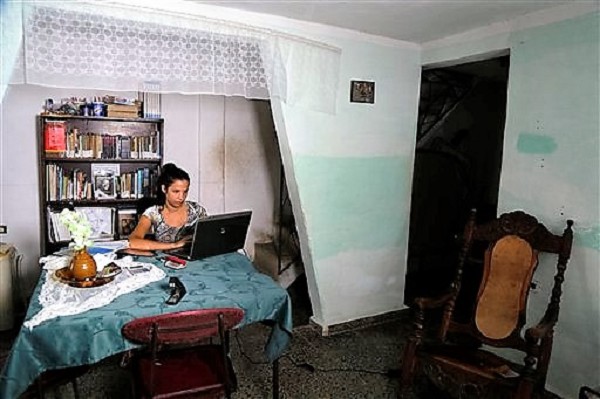
Maybe mom and pop's hopes of such a "school" should not be too high. ONLINE SCHOOLS: New National Study Finds Weaker Academic Performance
December 6, 2015
Leave a Comment
|
||||||||||||||
| Printer Friendly Story View |
Almost everywhere you go in Michigan are signs touting online education.
Yes, parents, your kid can sit home and learn just as well as if he or she took the bus to a building and sat in front of a live teacher, the ads imply.
Thousands of Michigan parents have pinned their hopes to rescue Junior's or Sister's lagging education on a computer-based program at home.
Maybe mom and pop's hopes of such a "school" should not be too high, a new national study indicates.
See: https://credo.stanford.edu/pdfs/Online%20Press%20Release.pdf
The main aspect of online "education" that doesn't seem to be in doubt is the profitability of the Wall Street operated programs of such firms as K-12 Inc., Britain's Pearson Education, and other companies.
Just think of it, Mr. or Ms. Superintendent of Schools: no need to run expensive buses, hire and train teachers, evaluate programs, control and discipline students, support costly buildings, heat, lights, cafeterias, etc., etc. And you get to keep, say, 50 percent of the state school aid per student, depending on the contract deal.
A license to steal, no doubt! As we have observed here before, Wall Street has found a new golden goose -- public education. and it is a fat one run by complicit mismanagers in many cases, unfortunately.
"Innovative new research suggests that students of online charter schools had significantly weaker academic performance in math and reading, compared with their counterparts in conventional schools. The National Study of Online Charter Schools, released recently, offers a rigorous analysis of the operations of online charter schools, their policy environments, and their impacts on student achievement.
The study, if it is given a public airing by the media, seems to dash the hopes of corporations for increasing profits through higher enrollment.
Conducted by three independent research institutions, the study is the most comprehensive examination of online charter schools to date, and is organized into separate, topical report volumes.
In Volume I, Mathematica Policy Research describes the universe of online charter schools, the students they serve, and their operations. In Volume II, the Center on Reinventing Public Education (CRPE) at the University of Washington describes the policy environments of online charter schools and provides recommendations to state policymakers. In Volume III, the Center for Research on Education Outcomes (CREDO) at Stanford University describes the achievement effects of online charter schools.
Mathematica's report offers a snapshot of the 200 online charter schools operating across the country and the 200,000 elementary, middle, and high school students they serve. The report examines the instructional programs of online charter schools; methods used to engage students and parents, along with expectations of parental involvement; the teachers and principals of online charter schools; and the schools' management and governance.
Mathematica's analysis finds:
* Student-driven, independent study is the dominant mode of learning in online charter schools, with 33 percent of online charter schools offering only self-paced instruction
* Online charter schools typically provide students with less live teacher contact time in a week than students in conventional schools have in a day
* Maintaining student engagement in this environment of limited student-teacher interaction is considered the greatest challenge by far, identified by online charter school principals nearly three times as often as any other challenge
* Online charter schools place significant expectations on parents, perhaps to compensate for limited student-teacher interaction, with 43, 56, and 78 percent of online charters at the high school, middle, and elementary grade levels, respectively, expecting parents to actively participate in student instruction
Brian Gill, a Mathematica senior fellow and lead author of the report, said, "Challenges in maintaining student engagement are inherent in online instruction, and they are exacerbated by high student-teacher ratios and minimal student-teacher contact time, which the data reveal are typical of online charter schools nationwide. These findings suggest reason for concern about whether the sector is likely to be effective in promoting student achievement."
The Center on Reinventing Public Education conducted an extensive examination of how state policy shapes the online charter school landscape. Researchers found that online charter schools exist in a number of different policy environments due to variation in state charter law and administrative regulation.
Most of the existing regulation is reactive to controversy (restrictions on growth and autonomy), rather than proactive policies to guide the unique opportunities and challenges of online charters.
The authors found several drawbacks to forcing online schools into the charter context, including:
* Open admission requirements that prevent schools from screening for students who are most likely to be successful in an online school.
* Authorizing and accountability provisions that are not well suited to the unique challenges of regulating online schools.
* Funding mechanisms that preclude outcomes-based funding CRPE director Robin Lake, who co-authored the study, said, "We need policies that address legitimate concerns without needlessly restricting growth."
The report recommends that policymakers consider moving online schools out of the charter context, or craft unique provisions specific to online charters."
The CREDO at Stanford University report presents the most comprehensive findings available to date about impacts of online charter enrollment on the academic progress of students. While findings vary for each student, the results in CREDO's report show that the majority of online charter students had far weaker academic growth in both math and reading compared to their traditional public school peers. To conceptualize this shortfall, it would equate to a student losing 72 days of learning in reading and 180 days of learning in math, based on a 180-day school year. This pattern of weaker growth remained consistent across racial-ethnic sub-populations and students in poverty.
"While the overall findings of our analysis are somber, we do believe the information will serve as the foundation for constructive discussions on the role of online schools in the K-12 sector. We see an opportunity for the providers to do a better job of documenting the benefits they provide to their students and to connect with and learn from operators who are doing well, "said Dr. James Woodworth, Senior Quantitative Research Analyst for CREDO at Stanford University.
This mixed-method analysis included data from 158 online schools across 17 states and the District of Columbia. The data set for online school students is restricted to those students attending public, fulltime online charter schools.
The National Study of Online Charter Schools was funded by the Walton Family Foundation. "We support research on difficult questions like these because we want to know what is working for kids -- and what is not. Innovation in education takes time, but we must test whether new ideas are working and make changes when we learn that ideas with potential are falling short," said the director of research and evaluation for the Walton Family Foundation, Marc Holley, concluding:
"We're grateful that CRPE, Mathematica, and CREDO have studied these schools and are sharing their findings. Knowing the facts helps parents, educators, policymakers, and funders make smarter, more informed decisions that benefit children."
###
| Printer Friendly Story View |

|
Prior Article
March 5, 2025 by: Stephen Kent St. Patricks Parade 2025 - IT's TIME |

|
Next Article
February 10, 2020 by: Rachel Reh Family Winter Fun Fest is BACC Hot Spot for 2/10/2020 |
|
|

Dave Rogers |
|
|
|
Printer-Friendly Story View
0200 Nd: 04-28-2025 d 4 cpr 0
12/31/2020 P3v3-0200-Ad.cfm
SPONSORED LINKS
12/31/2020 drop ads P3v3-0200-Ad.cfm
